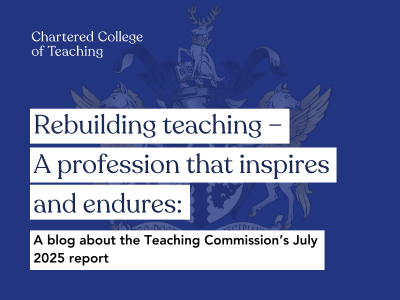The Teaching Commission’s July 2025 report, ‘Shaping the Future of Teaching’, offers a powerful and timely analysis of the state of teaching in England. Drawing on extensive evidence and practitioner insight, including from our series of Fellow roundtables hosted by Fellows of the Chartered College of Teaching who sat on the commission, the report sets out a vision for a profession that is valued, supported and sustainable.
It’s not just a diagnosis; it’s a roadmap.
A profession under pressure
The statistics in the report reveal a profession teetering on the edge. It takes ten newly qualified teachers entering the classroom to replace every seven experienced teachers who leave, highlighting a widening gap in mentorship, expertise and institutional memory.
Recruitment targets have been missed year after year, and retention rates continue to fall, with 40% of teachers leaving the profession within the first ten years of qualifying. The numbers leaving after five years are skyrocketing. The middle tier of the profession, those with five to fifteen years’ experience, is shrinking most rapidly, resulting in fewer candidates for leadership and fewer role models for newer colleagues.
But the crisis isn’t just numerical; it’s cultural. Teachers report increasing workload intensity, poor classroom behaviour, and a lack of professional agency. For black and global majority teachers and returner mothers, structural barriers persist, limiting progression and contribution.
Without urgent action, the cumulative impact will be felt not only in classrooms but across school systems.
What needs to change
The Commission’s recommendations are wide ranging, but several themes stand out:
- Revitalising NPQs: Leadership qualifications must go beyond technical knowledge. They should focus on people management, team building and creating empowering school cultures.
- Workload and wellbeing: The DfE’s survey of teachers and leaders working lives should measure not just hours worked, but the intensity and quality of that work. Employers must engage in meaningful dialogue about workload and directed time.
- Inclusion and SEND: Funding must align with policy. Inclusion cannot be achieved without investment in training, support staff and school infrastructure.
- Professional learning: Teachers should be supported to maintain subject and phase specialisms while embracing new pedagogical approaches. CPD must be career linked and responsive to professional interests.
- Accountability reform: The current framework must be reimagined to measure impact without undermining morale. Exit surveys and stay surveys should inform school culture reviews and action planning.
- Adequate funding and support: The report recognises the evolving role of schools in supporting pupils and families. With the introduction of multi-agency child protection teams, schools are increasingly becoming frontline services. This shift must be matched with funding, training and structural support to protect staff wellbeing.
A vision for the future
The report doesn’t offer quick fixes. Instead, it proposes a direction of travel towards a profession that inspires and flourishes. One where teachers are trusted, supported and given the space to grow. One where leadership is nurtured, inclusion is real and every child benefits from high-quality teaching.
This is a moment for reflection, but also for action. The report invites us to listen, to lead with compassion and to rebuild teaching as a profession worth staying in.

